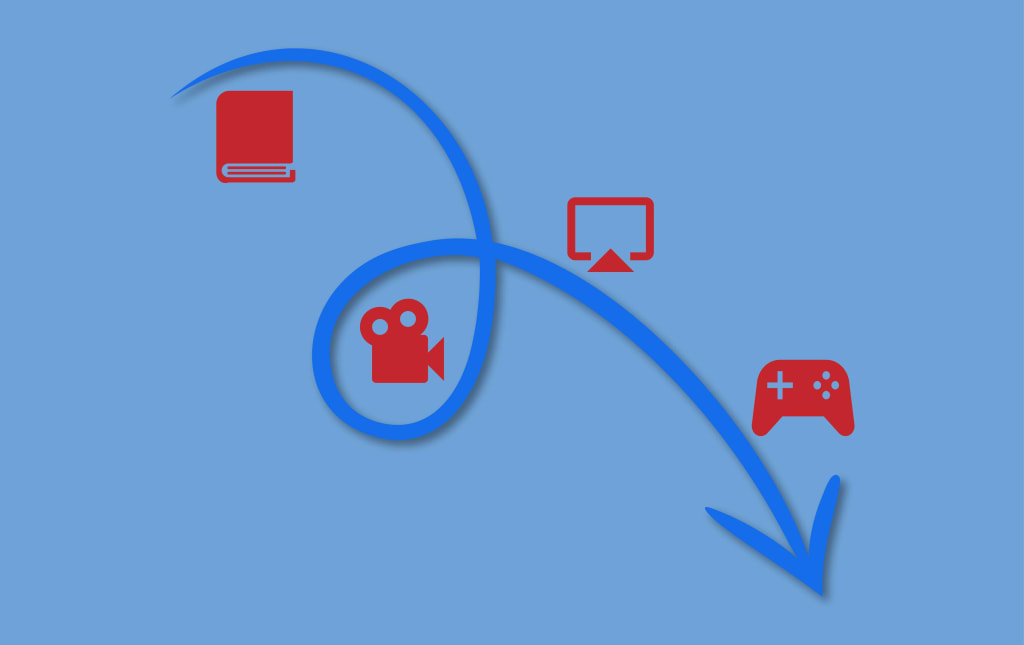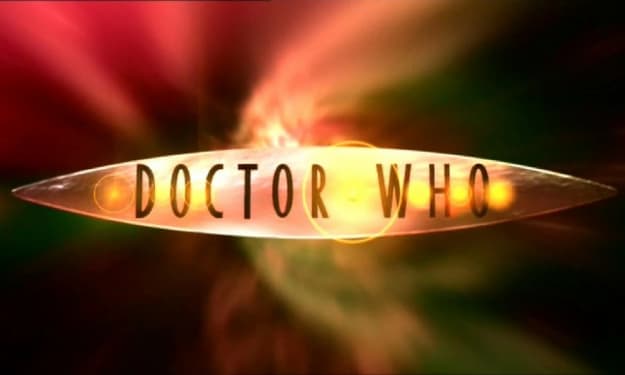Story Adaptations: Why Can It Go So Wrong?
Book > Film > TV > Video Game

This post originated on the Space & Lasers blog.
Hey everyone!
It’s been a few busy months for me (moving states and all the fun that comes with that), but I’m back for a new post for the year! (And may I say that I much prefer writing these in a warmer climate.)
When I first put this topic down for a blog post, I was originally just going to talk about video game adaptations and the issues they face.
I recently made the call to try turn my Nash I screenplay into a novel. As I’ve taken the time to explore the differences between the two mediums — and all the nuances I need to learn about novel writing — it got me thinking more about adaptations of all kinds.
Whether it be a book into a movie, a movie into a book, a video game into a movie, a movie into a video game… whatever it is. There are always considerations when converting a story from one medium into another. There will always be changes to better suit that medium. Sometimes this is done very well. Sometimes it’s done horribly (and almost vindictively so).
So, let’s talk through some of the factors affecting adaptations that can determine the decisions that get made, and ultimately their success.
Characters
Books and even video games have a lot more hours in them. This gives them the ability to introduce and properly develop a wide selection of characters. TV series have more opportunities to do this, but still face limitations. Movies tend to have the most limitations when it comes to character numbers and development — they need to cut to the chase.
What all the above means is when shifting a story from one medium to another, there’s often a requirement to scale back or add characters. How this is done can really affect how the outcome is received. The non-canon novelisation of Star Wars Episode III introduces character interactions and perspectives the movie didn’t have time for. The TV series of The Expanse combines characters together or cuts characters and has someone else take up their role.
This is just touching the surface of what can be done. In the above cases, it works. There wouldn’t be room for all The Expanse book characters in the TV show. But the TV show still aims to have those big character moments and actions so the book audience can appreciate them. Of course, a novelisation of Episode III would have more time to delve into things. And in essence, it’s a treat to read the book and get more from the story.
Now I’m not saying the above choices would be loved by everyone, but I think they’re widely accepted. That isn’t always the case, however. Sometimes these creative choices are badly executed and the majority outright despise them. So how does it get to that point? I think it’s when a character’s essence is completely changed to fit a new narrative. People know who a character is supposed to be from the time spent with them in the original media form. When you excitedly sit down to see the new medium and you barely recognise the character beyond name, of course it won’t sit right.
In my opinion, one of the most important things when translating a story from one medium to another is ensuring the core of each character remains intact. If you have to remove a character and give their actions to someone else, that’s fine. But the character you give them to should be a good fit, and the actions shouldn’t change the core of who they are.
The Narrative Beats
Above, I mentioned characters changing to fit a new narrative. I’m sure we’ve all read a book or played a video game, then watched the TV series or movie, only to find the story has been changed completely or the ending is different.
Now I completely understand the need for changes. As I said, sometimes you have to condense things or stretch things out to fit in the new medium. But it’s how well those things are handled that can make or break the translation. Even when condensing events, the overall narrative should still feel the same. We should ultimately still hit the same major plot points and end up in the same place, even if we end up there in 20 minutes of screen time instead of 2 hours reading time.
In my opinion, the changes get out of hand and destroy a project when there is change for the sake of change. The old ‘Some people have read the book so we need to change the whole ending so it’s a surprise’.
Now I can’t understate how much I HATE this line of thinking. When I’m watching the movie of a another medium, I’m here to see that story play out in movie form. In a book, I have to visualise the story from words. In a movie, I want to see those words play out. I don’t care that I know the outcome, it’s about the joy of seeing it on screen. The same goes for video game adaptations. If they made Mass Effect into a movie, I want to see some of those iconic cutscenes playing out in live-action. THAT is what excites me.
I accept this is just my opinion, and many others feel differently. But given the sheer number of complaints I read online about change for the sake of change, I feel some of these adaptations would see far more success if they simply stuck closer to the source material when translating the story.
The Theme and Premise
Here’s where change starts to get taken to the next level. All good stories have a theme and premise at their core. Even if the story wasn’t written with them in mind, they usually form as everything comes together. Even if we don’t realise it, these underlying concepts are why we might connect with and love a particular story.
Sometimes when translating the story, some see the need to change these core things. Maybe they’re trying to change the story to fit a modern premise/theme. Maybe they just think their choice of premise/theme is better. Worst yet, maybe it’s a movie where all the producers care about are the surface-level things like the names of things and the character appearances for toy sales. In this case, you often hear the advice: ‘Ignore the source material’. Then writers just write whatever people think will make money.
I truly feel that changing the theme or premise — changing all the CORE things about a story — should be the biggest NO. If you change these things, you’re no longer telling the same story anymore, just a hollow shell. And while that hollow shell may get lucky enough to find some form of success, it’s only really achieving that by wearing the mask of a different story over its own.
Industry & Business
On the back of the previous point, it’s time to talk about the industry. This one probably applies the least to books and more to films, TV and video games. Happy to be disagreed with in the comments on this one!
Storytelling in these visual mediums is a business, and as such, decisions are always made around money. How much will cost? How much will it make? How do we make it make more?
The limitations of money often see the story impacted in certain ways. For example, the higher-ups won’t fund more than six episodes. Ideally, the story would be told in eight, so now the writer has to take some massive liberties to get the story told in that allotted six. And a producer might feel a certain type of scene, say a car chase, will make more money, so now the writer has to work that in somewhere.
I accept that within the screen industry, these limitations are sometimes unavoidable. It’s unrealistic to expect the perfect adaptation. Sometimes achieving it would be completely impossible. So, I accept there can be a need to change character, narrative, theme and premise to please the industry’s limitations.
What I do feel, and make a plea for, is only administering these massive changes when it absolutely, 100% has to be done. If you can fund those eight episodes easily but just want to fund six for the hell of it, please fund the eight. When translating a story from one medium to another, there are enough hurdles to pass without unnecessarily burdening the writer. And what the writer might have to do to meet those limitations might completely kill the story, making the whole endeavour a waste of time where you may as well have funded zero episodes.
---
As always, thanks for reading through my latest post! I feel there’s so much to talk about in this topic area, but for now, I’ll leave it here.
I would love to hear more about your opinions on adaptations. What do you like to see? What matters to you? Do you feel differently about any of the points I made?
Let me know in the comments or on socials!
Next blog topic? Hopefully you guessed it when I teased it — I’ll be talking about the inspiration I took from Doctor Who.
Til then,
Dean
About the Creator
Space & Lasers
I'm a free-time sci-fi writer keen to share my work, discuss my inspirations and just talk about writing in general.
All blogs were originally posted on my website. You can find my site here: https://spaceandlasers.com/






Comments
There are no comments for this story
Be the first to respond and start the conversation.